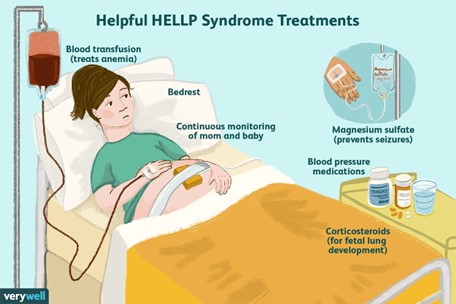A nurse is teaching a client who has gestational hypertension about the importance of bed rest.
Which of the following statements by the client indicates an understanding of the teaching?
“Bed rest will help lower my blood pressure and reduce the risk of complications.”
“Bed rest will help increase the blood flow to my kidneys and prevent proteinuria.”
“Bed rest will help increase the blood flow to my kidneys and prevent proteinuria.”
“Bed rest will help increase the blood flow to my kidneys and prevent proteinuria.”
The Correct Answer is C
The correct answer is choice C. “Bed rest will help decrease the workload on my heart and improve oxygen delivery to my baby.” This is because gestational hypertension is a condition where the blood pressure is elevated after 20 weeks of pregnancy, which can affect the blood flow to the placenta and reduce the oxygen and nutrients that reach the fetus. Bed rest can help lower the blood pressure and increase the blood flow to the placenta.
Choice A is wrong because bed rest alone may not be enough to lower the blood pressure and reduce the risk of complications. Some women may need medications or hospitalization to control their blood pressure and prevent preeclampsia, a serious complication of gestational hypertension.
Choice B is wrong because bed rest does not directly affect the kidney function or prevent proteinuria, which is the presence of protein in the urine. Proteinuria is a sign of preeclampsia, not gestational hypertension.
Bed rest may help prevent the progression of gestational hypertension to preeclampsia, but it does not treat proteinuria.
Choice D is wrong because bed rest does not prevent fluid retention or reduce the swelling in the legs.
Fluid retention and swelling are common symptoms of pregnancy, not specific to gestational hypertension. They are caused by hormonal changes and increased blood volume, not by high blood pressure.
Bed rest may worsen the swelling by reducing the circulation in the legs.
Nursing Test Bank
Naxlex Comprehensive Predictor Exams
Related Questions
Correct Answer is B
Explanation
The correct answer is choice B. Platelets 80,000/mm3.This is because HELLP syndrome is a severe form of preeclampsia characterized byHemolysis,Elevated Liver enzymes, andLow Platelets.Platelets are blood cells that help with clotting, and a normal range is 150,000 to 450,000/mm3.A low platelet count (<100,000/mm3) indicates a risk of bleeding and organ damage.
Choice A is wrong because hemoglobin 12 g/dL is within the normal range for pregnant women (11 to 16 g/dL).Hemoglobin is a protein in red blood cells that carries oxygen, and hemolysis is the breakdown of red blood cells.
Choice C is wrong because AST 15 U/L is within the normal range for women (10 to 35 U/L).AST is a liver enzyme that indicates liver function, and elevated liver enzymes (>70 U/L) indicate liver damage.
Choice D is wrong because LDH 90 U/L is within the normal range for women (85 to 225 U/L).LDH is another liver enzyme that indicates liver function, and elevated LDH (>600 U/L) indicates liver damage.

Correct Answer is C
Explanation
The correct answer is choice C.“Bed rest will help decrease the workload on my heart and improve oxygen delivery to my baby.” This is because gestational hypertension is a condition where the blood pressure is elevated after 20 weeks of pregnancy, which can affect the blood flow to the placenta and reduce the oxygen and nutrients that reach the fetus.Bed rest can help lower the blood pressure and increase the blood flow to the placenta.
Choice A is wrong because bed rest alone may not be enough to lower the blood pressure and reduce the risk of complications.Some women may need medications or hospitalization to control their blood pressure and prevent preeclampsia, a serious complication of gestational hypertension.
Choice B is wrong because bed rest does not directly affect the kidney function or prevent proteinuria, which is the presence of protein in the urine.Proteinuria is a sign of preeclampsia, not gestational hypertension.
Bed rest may help prevent the progression of gestational hypertension to preeclampsia, but it does not treat proteinuria.
Choice D is wrong because bed rest does not prevent fluid retention or reduce the swelling in the legs.
Fluid retention and swelling are common symptoms of pregnancy, not specific to gestational hypertension.They are caused by hormonal changes and increased blood volume, not by high blood pressure.
Bed rest may worsen the swelling by reducing the circulation in the legs.
Whether you are a student looking to ace your exams or a practicing nurse seeking to enhance your expertise , our nursing education contents will empower you with the confidence and competence to make a difference in the lives of patients and become a respected leader in the healthcare field.
Visit Naxlex, invest in your future and unlock endless possibilities with our unparalleled nursing education contents today
Report Wrong Answer on the Current Question
Do you disagree with the answer? If yes, what is your expected answer? Explain.
Kindly be descriptive with the issue you are facing.
